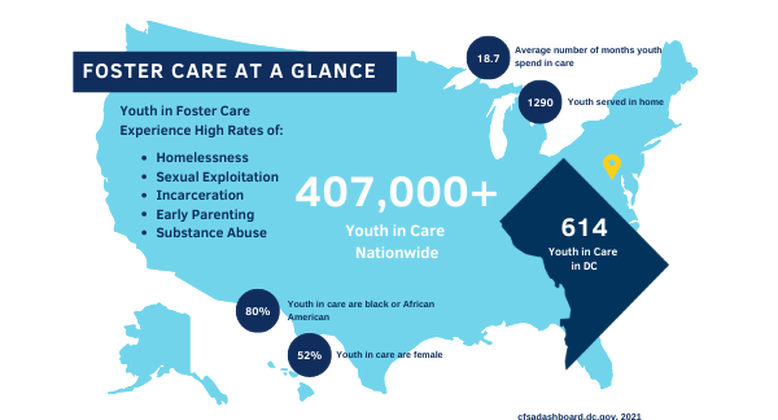Understanding Foster Care
|
In the District of Columbia, there are roughly 614 youth in out-of-home foster care and hundreds more in surrounding counties. A child enters into the foster care system for many different reasons, including sexual or physical abuse, and educational, medical, or emotional neglect.
Foster care is not meant to be permanent. It is a means to ensure the safety of the child, ideally rehabilitate the family, and ultimately reunify the child to their birth parents. However, this may not always occur, and other permanency options may be available for the child, such as living with adoption, guardianship, or living with kin. |
Aside from the trauma they faced before entering into care, youth often experience trauma simply from being put into foster care. The physical act of entering into foster care- being removed from their home, community, and, often times, school and placed with foster parents who are in most cases a stranger, all within a day- can be scary, disorienting, and confusing for a child.
The trauma that occurs has staggering effects. Only 54% of foster care youth graduate from high school, over 30% experience homelessness, and 8% graduate from college. Foster youth who age out of the system are 10 times more likely to be incarcerated then their peers who were in stable housing.
Despite the disheartening facts, there are proven methods to mitigate negative effects on a child's life. Being trauma-informed is crucial when working with foster youth. Trauma-informed care means treating a whole person, taking into account past trauma and the resulting coping mechanisms when attempting to understand behaviors and treat the patient*. At BEST Kids, we strive be trauma-informed in all of our approaches to ensure our youth have holistic experiences. Our mentoring program is based on trauma-informed best practices, resulting in positive youth development, academic achievement, and the overall well-being of the child.
The trauma that occurs has staggering effects. Only 54% of foster care youth graduate from high school, over 30% experience homelessness, and 8% graduate from college. Foster youth who age out of the system are 10 times more likely to be incarcerated then their peers who were in stable housing.
Despite the disheartening facts, there are proven methods to mitigate negative effects on a child's life. Being trauma-informed is crucial when working with foster youth. Trauma-informed care means treating a whole person, taking into account past trauma and the resulting coping mechanisms when attempting to understand behaviors and treat the patient*. At BEST Kids, we strive be trauma-informed in all of our approaches to ensure our youth have holistic experiences. Our mentoring program is based on trauma-informed best practices, resulting in positive youth development, academic achievement, and the overall well-being of the child.
Foster Care Snapshot
cfsadashboard.dc.gov, 2021



